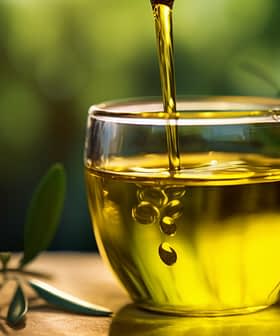Olive Oil May Protect Against Age-Related Macular Degeneration
A recent French study reported a decreased risk of late AMD among olive oil users, "after adjustment for multiple potential confounders.”
Age-related macular degeneration (AMD) is the primary cause of blindness in older adults in developed countries and is linked to lifestyle factors like smoking and poor diet. The burden of AMD is projected to increase globally by about 40 percent from 2020 to 2040, with recent studies showing that regular consumption of olive oil may reduce the risk of AMD progression in older adults.
In developed countries, the primary cause of blindness in older adults is age-related macular degeneration (AMD). The risk factors for AMD are multifactorial and linked to lifestyle habits such as smoking, poor diet and physical activity as well as genetic factors.
According to The Lancet Global Health publication, from 2020 to 2040 AMD burden is projected to increase by about 40 percent globally.
See Also:Olive Oil Health Benefits
The lack of effective treatment modalities for advanced AMD has refocused efforts of researchers on developing preventive strategies for AMD development or progression, aimed at reversible risk factors such as nutrition and lifestyle practices.
Increasing clinical evidence associated adherence to a Mediterranean diet (MD) rich in olive oil with reduced risk of AMD progression; the most recent study on MD found the risk of AMD development to late stage lowered as much as 26 percent in older adults.
Despite extensive epidemiological studies on the potential role of nutrition especially dietary fat in AMD prevention, there are very few published studies on direct olive oil and AMD association.
The findings of a recent study by French researchers revealed a direct link between olive oil consumption and reduced incidence of AMD in a group of elderly French volunteers.
The French study design and some of their findings were remarkably similar to a large Australian study, the only other published clinical research on a direct association between olive oil intake and lower occurrence of late AMD.
However, the French findings revealed greater regular consumption of olive oil by the French participants (73.2 percent) compared to the Australian study population (53.6 percent). In addition, the investigators compared other oils and butter as related to AMD and did not find any association.
Although olive oil major component is oleic acid, nevertheless the role of dietary monounsaturated fatty acids (MUFAs) and its link to AMD is highly questionable due to contradictory published reports.
French researchers deduced that the protective effect of olive oil might be due to possibly phenolic components such as oleocanthal, hydroxytyrosol and oleuropein all previously reported to exhibit significant anti-inflammatory and antioxidant activities.
One plausible protective mechanism, the authors argued is through oleocanthal, which has comparable anti-inflammatory effects to a low dose of ibuprofen, whereby it lowers oxidative stress naturally over time reducing progression of AMD in older adults.
Interestingly, previous in vitro studies have demonstrated that antioxidant activity of hydroxytyrosol imparted considerable protection of mitochondria within retina cells of the eyes against antioxidant damage. Therefore, the synergistic mechanism action of olive oil bioactive components remains to be determined.
The French group also showed that other confounding factors such as diet, socioeconomic status and BMI had negligible influence on the connection between olive oil use and late AMD.
Authors concluded that larger studies are required for establishing whether olive oil reduces genetic risk in adults affected by AMD. In addition, further studies will clarify the underlying protective mechanism of olive oil phytonutrients on the late AMD onset and progression.









